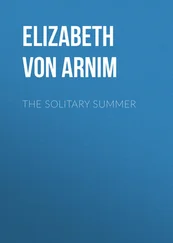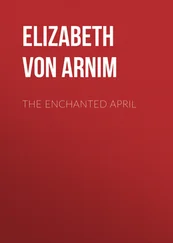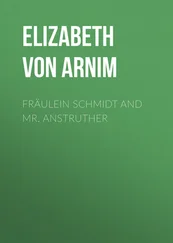Elizabeth von Arnim - The Princess Priscilla's Fortnight
Здесь есть возможность читать онлайн «Elizabeth von Arnim - The Princess Priscilla's Fortnight» — ознакомительный отрывок электронной книги совершенно бесплатно, а после прочтения отрывка купить полную версию. В некоторых случаях можно слушать аудио, скачать через торрент в формате fb2 и присутствует краткое содержание. Издательство: Иностранный паблик, Жанр: foreign_prose, foreign_antique, на английском языке. Описание произведения, (предисловие) а так же отзывы посетителей доступны на портале библиотеки ЛибКат.
- Название:The Princess Priscilla's Fortnight
- Автор:
- Издательство:Иностранный паблик
- Жанр:
- Год:неизвестен
- ISBN:нет данных
- Рейтинг книги:3 / 5. Голосов: 1
-
Избранное:Добавить в избранное
- Отзывы:
-
Ваша оценка:
- 60
- 1
- 2
- 3
- 4
- 5
The Princess Priscilla's Fortnight: краткое содержание, описание и аннотация
Предлагаем к чтению аннотацию, описание, краткое содержание или предисловие (зависит от того, что написал сам автор книги «The Princess Priscilla's Fortnight»). Если вы не нашли необходимую информацию о книге — напишите в комментариях, мы постараемся отыскать её.
The Princess Priscilla's Fortnight — читать онлайн ознакомительный отрывок
Ниже представлен текст книги, разбитый по страницам. Система сохранения места последней прочитанной страницы, позволяет с удобством читать онлайн бесплатно книгу «The Princess Priscilla's Fortnight», без необходимости каждый раз заново искать на чём Вы остановились. Поставьте закладку, и сможете в любой момент перейти на страницу, на которой закончили чтение.
Интервал:
Закладка:
Fritzing, unusually gifted, and enterprising from the first—which explains the gulf between pig-watching and Hofbibliothekar —had spent ten years in Paris and twenty in England in various capacities, but always climbing higher in the world of intellect, and had come during this climbing to speak English quite as well as most Englishmen, if in a statelier, Johnsonian manner. At fifty he began his career in Kunitz, and being a lover of children took over the English education of the three princesses; and now that they had long since learned all they cared to know, and in Priscilla's case all of grammar at least that he had to teach, he invented a talent for drawing in Priscilla, who could not draw a straight line, much less a curved one, so that she should still be able to come to the library as often as she chose on the pretext of taking a drawing-lesson. The Grand Duke's idea about his daughters was that they should know a little of everything and nothing too well; and if Priscilla had said she wanted to study Shakespeare with the librarian he would have angrily forbidden it. Had she not had ten years for studying Shakespeare? To go on longer than that would mean that she was eager, and the Grand Duke loathed an eager woman.
But he had nothing to say against a little drawing; and it was during the drawing-lessons of the summer Priscilla was twenty-one that the Countess Disthal slept so peacefully. The summer was hot, and the vast room cool and quiet. The time was three o'clock—immediately, that is, after luncheon. Through the narrow open windows sweet airs and scents came in from the bright world outside. Sometimes a bee would wander up from the fruit-gardens below, and lazily drone round shady corners. Sometimes a flock of pigeons rose swiftly in front of the windows, with a flash of shining wings. Every quarter of an hour the cathedral clock down in the town sent up its slow chime. Voices of people boating on the river floated up too, softened to melodiousness. Down at the foot of the hill the red roofs of the town glistened in the sun. Beyond them lay the sweltering cornfields. Beyond them forests and villages. Beyond them a blue line of hills. Beyond them, said Priscilla to herself, freedom. She sat in her white dress at a table in one of the deep windows, her head on its long slender neck, where the little rings of red-gold hair curled so prettily, bent over the drawing-board, her voice murmuring ceaselessly, for time was short and she had a great many things to say. At her side sat Fritzing, listening and answering. Far away in the coolest, shadiest corner of the room slumbered the Countess. She was lulled by the murmured talk as sweetly as by the drone of the bee.
"Your Grand Ducal Highness receives many criticisms and much advice on the subject of drawing from the Herr Geheimrath?" she said one day, after a lesson during which she had been drowsily aware of much talk.
"The Herr Geheimrath is most conscientious," said Priscilla in the stately, it-has-nothing-to-do-with-you sort of tone she found most effectual with the Countess; but she added a request under her breath that the lieber Gott might forgive her, for she knew she had told a fib.
Indeed, the last thing that Fritzing was at this convulsed period of his life was what his master would have called conscientious. Was he not encouraging the strangest, wickedest, wildest ideas in the Princess? Strange and wicked and wild that is from the grand ducal point of view, for to Priscilla they seemed all sweetness and light. Fritzing had a perfect horror of the Grand Duke. He was everything that Fritzing, lean man of learning, most detested. The pleasantest fashion of describing the Grand Duke will be simply to say that he was in all things, both of mind and body, the exact opposite of Fritzing. Fritzing was a man who spent his time ignoring his body and digging away at his mind. You know the bony aspect of such men. Hardly ever is there much flesh on them; and though they are often ugly enough, their spirit blazes at you out of wonderful eyes. I call him old Fritzing, for he was sixty. To me he seemed old; to Priscilla at twenty he seemed coeval with pyramids and kindred hoarinesses; while to all those persons who were sixty-one he did not seem old at all. Only two things could have kept this restless soul chained to the service of the Grand Duke, and those two things were the unique library and Priscilla. For the rest, his life at Kunitz revolted him. He loathed the etiquette and the fuss and the intrigues of the castle. He loathed each separate lady-in-waiting, and every one of the male officials. He loathed the vulgar abundance and inordinate length and frequency of the meals, when down in the town he knew there were people a-hungered. He loathed the lacqueys with a quite peculiar loathing, scowling at them from under angry eyebrows as he passed from his apartment to the library; yet such is the power of an independent and scornful spirit that though they had heard all about Westphalia and the pig-days never once had they, who made insolence their study, dared be rude to him.
Priscilla wanted to run away. This, I believe, is considered an awful thing to do even if you are only a housemaid or somebody's wife. If it were not considered awful, placed by the world high up on its list of Utter Unforgivablenesses, there is, I suppose, not a woman who would not at some time or other have run. She might come back, but she would surely have gone. So bad is it held to be that even a housemaid who runs is unfailingly pursued by maledictions more or less definite according to the education of those she has run from; and a wife who runs is pursued by social ruin, it being taken for granted that she did not run alone. I know at least two wives who did run alone. Far from wanting yet another burden added to them by adding to their lives yet another man, they were anxiously endeavouring to get as far as might be from the man they had got already. The world, foul hag with the downcast eyes and lascivious lips, could not believe it possible, and was quick to draw its dark mantle of disgrace over their shrinking heads. One of them, unable to bear this, asked her husband's pardon. She was a weak spirit, and now lives prostrate days, crushed beneath the unchanging horror of a husband's free forgiveness. The other took a cottage and laughed at the world. Was she not happy at last, and happy in the right way? I go to see her sometimes, and we eat the cabbages she has grown herself. Strange how the disillusioned find their peace in cabbages.
Читать дальшеИнтервал:
Закладка:
Похожие книги на «The Princess Priscilla's Fortnight»
Представляем Вашему вниманию похожие книги на «The Princess Priscilla's Fortnight» списком для выбора. Мы отобрали схожую по названию и смыслу литературу в надежде предоставить читателям больше вариантов отыскать новые, интересные, ещё непрочитанные произведения.
Обсуждение, отзывы о книге «The Princess Priscilla's Fortnight» и просто собственные мнения читателей. Оставьте ваши комментарии, напишите, что Вы думаете о произведении, его смысле или главных героях. Укажите что конкретно понравилось, а что нет, и почему Вы так считаете.












